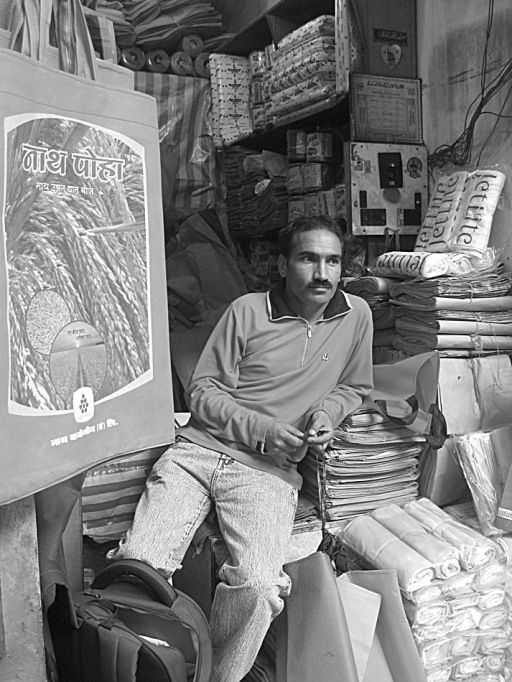The ban on polythene carry bags has given fillip to sales of alternatives like paper bags, most of which are prepared locally. Majid Maqbool reports.

In a busy lane of grocery stores, the Bhat Robe Store in Maharaj Bazar wears a different look. Earlier, it was a major selling point of polythene bags, now it stocks carry bags made of jute, cotton and paper only – all biodegradable. After the ban on polythene bags from May this year these eco-friendly carry bags replaced them.
The ban on polythene bags has given a fillip to the demand of biodegradable paper bags in the market. The owners of the Bhat store have also started a small unit employing over 20 people, to make these eco-friendly bags. “People have started using paper and cotton bags instead of polythene bags as they realise the importance of such eco-friendly alternatives,” says Omar Ahmad Bhat who sells a good number of these bags everyday. He says a “large” number of people have started earning their livelihood from it.
Unlike polythene bags that were brought in from outside the state, paper and cotton bags are being made locally. “Besides paper bags, jute and cotton bags are also made here, it retains some money in the valley and provides some employment,” Omar said.
He says the sale of jute and cotton bags has increased manifold since ban on polythene bags. Most people in Srinagar welcome ban on polythene and apparently are ready to bear a little inconvenience. “I brought this jute bag for Rs 10 some days back and I find it convenient to use for household shopping. It’s a good alterative to polythene bags,” says Bashir Ahmad, a local resident adding, “Polythene bags should be completely banned to save the environment.”
The ban on polythene bags has necessitated the use of biodegradable carry bags made of jute, cotton and paper, setting a healthy trend that is not only eco-friendly but also giving fillip to the local cottage industry involved in the making of these bags.
In 2006 High Court’s Division Bench comprising of Chief Justice B A Khan and Justice B A Kirmani had directed the state government to bring a legislation banning polythene bags after inviting suggestions from experts. The government banned the use of polythene in the state through SRO-122 under non- biodegradable material (management, handling and disposal) rules 2009, issued on May 11 this year.
But in the wake of reported contravention of the ban, State Pollution Control Board (SPCB) Kashmir in July issued fresh directives to enforce the ban in “letter and spirit”. “The ban on polythene has been more successful in Srinagar as compared to other districts,” says Mian Javed, Regional Director, SPCB Kashmir. “In Srinagar district people have cooperated although hundred percent ban has not been achieved yet.” He says overall impact of the ban is good and people have switched to use of eco-friendly bags available in the market. Traders who sold polythene carry bags earlier have started selling jute, cotton and paper bags.
Surrounded by piles of carry bags made of jute and other biodegradable material in his shop in Maharaja Bazaar Amirakadal, Gulzar Ahmad Sheikh wants a total ban on polythene. He sold polythene bags before the ban.
Unlike polythene bags which are dirt cheap, jute and cotton bags cost five to ten rupees a piece. “People now have to include the cost of carry bags in their daily shopping,” Shiekh says. He also claims that these alternative bags available in the market were not completely biodegradable.
The officials, however, disagree. “These bags are not harmful for the environment. They are eco-friendly and bio-degradable while polythene deprives soil of its fertility and doesn’t decay for centuries,” says Mian Javed.Sanitation and pollution control officials say that prior to the ban most of the solid waste consisted of polythene bags.
“Some 80-85 percent solid waste generated in Srinagar comprised of polythene bags as each household on an average used five polythene bags everyday before the ban,” Javed says.
The ban though not total, has reduced usage of polythene bags as there has been a marked increase in the sales of alternative carry bags. “The jute bags are selling well and people are getting used to them,” says Muhammad Rafi, a shopkeeper in Lal Chowk, Srinagar. “It is good that polythene bags have been banned. Polythene is a poison and it should be completely banned,” he says.
Many people are advocating ban on polythene-packed food stuff and groceries. “If there is a ban on use of polythene bags it should include products that come to grocery stores from outside the state as well,” says Zarqa Ahmed, a college student.
Around 15 percent food stuff imported from outside the state still comes packed in polythene. Officials say the government was mulling a ban on such items. “We have told them (the companies) to switch over to other alternatives as in the next phase items packed in polythene that comes from outside will also be banned,” Javed said.















